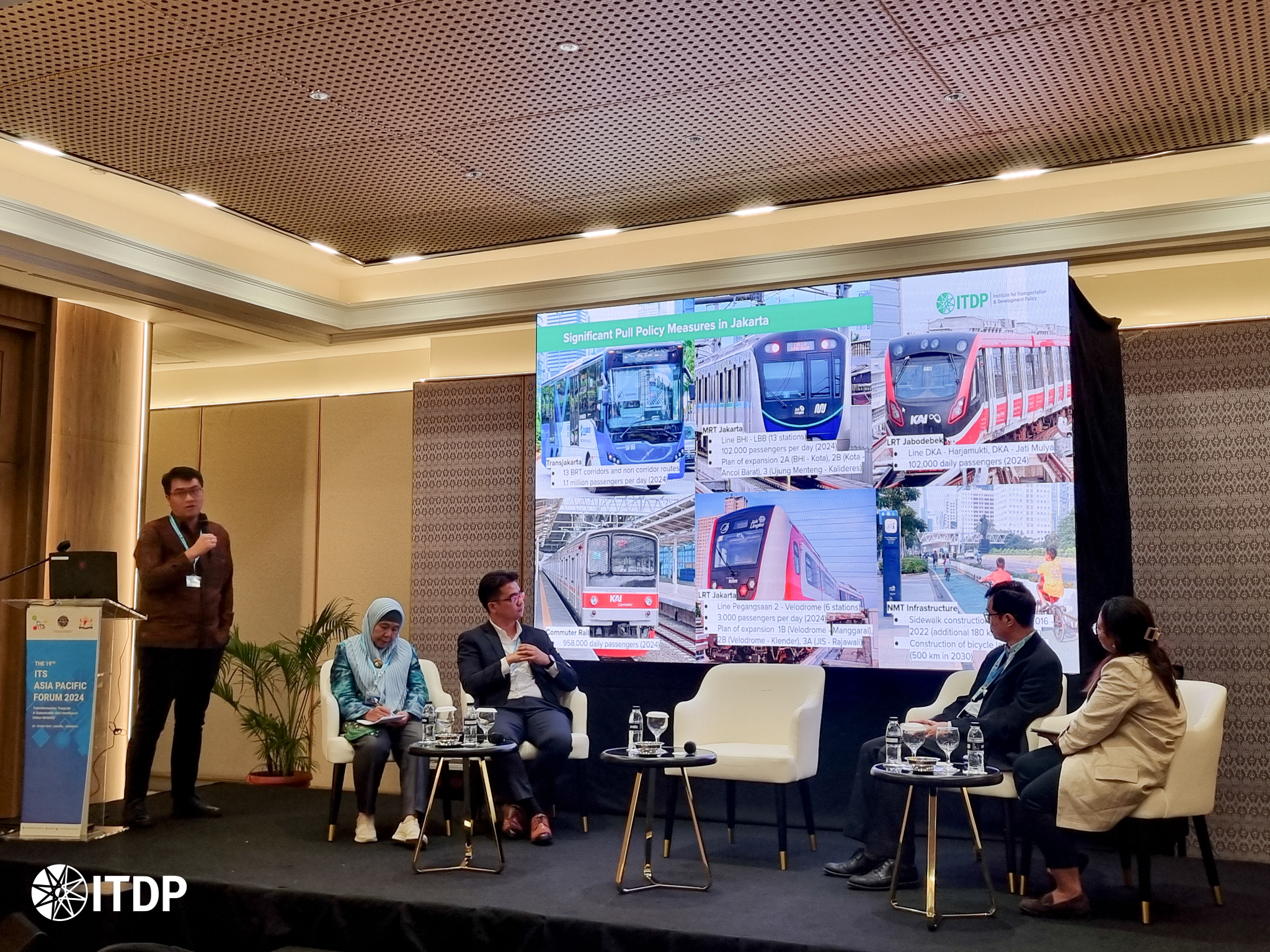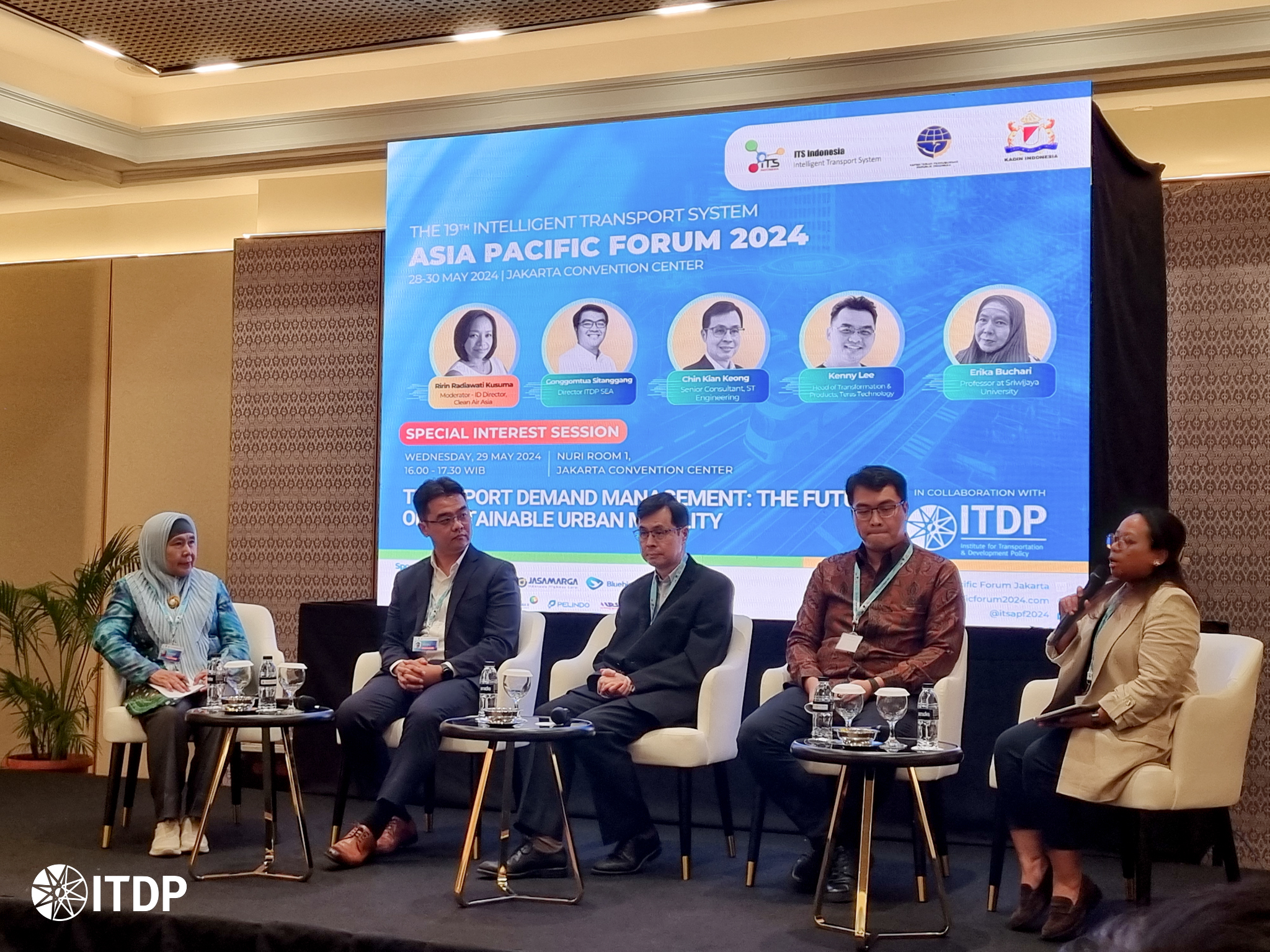June 07, 2024
The 19th ITS Asia Pacific Forum 2024 Special Interest Session: “Transport Demand Management, The Future of Sustainable Urban Mobility”
Gonggomtua Sitanggang, Southeast Asia Director of ITDP, was one of the speakers at the special interest session during the 19th ITS Asia Pacific Forum 2024, held on Wednesday, May 29th. This session, themed “Transport Demand Management: The Future of Sustainable Urban Mobility,” took place at the Jakarta Convention Center (JCC) and featured Ririn Radiawati Kusuma from Clean Air Asia as the moderator. Other speakers included Kenny Lee from Teras Technology, Professor Erika Buchari from the University of Sriwijaya, and Singaporean mobility consultant Chin Kian Keong.

This special interest session emphasized the significance of Transport Demand Management (TDM) in tackling urban mobility challenges. During his presentation, Gonggomtua Sitanggang highlighted Jakarta’s primary issues: traffic congestion and air pollution. To address these, Jakarta is promoting Transport Demand Management (TDM), which integrates push and pull policies. The pull policies aim to increase the use of public transportation and other sustainable transport modes, while the push policies seek to reduce private vehicle usage through Electronic Road Pricing (ERP), Low Emission Zones (LEZ), and Transit-Oriented Development (TOD) measures.
Despite Jakarta’s efforts to develop public transportation and Non-Motorized Transport (NMT) infrastructure, the public transportation usage rate remains low at around 10%. This low usage is partly due to inadequate implementation of push policies. Currently, the odd-even license plate policy has not effectively reduced private vehicle usage and has instead increased the use of motorcycles. To tackle this issue, ITDP Indonesia has recommended strategies such as ERP, LEZ, and improved parking management to help the Jakarta provincial government create a more comprehensive plan.
Chin Kian Keong shared insights on how Transport Demand Management (TDM) works in Singapore, stating that building new roads is not a sustainable solution. Instead, he advocated for optimizing the Intelligent Transport System (ITS), which includes real-time traffic monitoring and better information for road users. In addition, the implementation of Multi-Lane Free Flow (MLFF) technology is also considered an effective measure in reducing congestion and greenhouse gas emissions (GHG).
Kenny Lee discussed similar efforts in Malaysia, where they developed a very mature toll system with MLFF technology. According to him, highway operators must adapt to evolving technologies and collaborate with various institutions in road operations. Plus Highway, a toll road operator in Malaysia, has prepared a system using Machine Learning to anticipate traffic anomalies, which considers factors such as traffic volume, time, vehicle types, weather, road width, and holiday periods.
Meanwhile, Professor Erika Buchari explained that Palembang is in the early stages of developing public transportation. To increase passenger numbers, improvements to existing LRT services are necessary, including the integration of public transportation fares, the establishment of park-and-ride facilities, and the implementation of subscription-based fare systems. She suggested that Palembang should be developed with a Multi-modal Public Transport (MMPT) mindset to identify the diverse mobility needs.

The special interest session concluded with a discussion moderated by Ririn Radiawati Kusuma. The discussion covered various aspects, emphasizing the importance of accurate data, security principles, efficiency, inclusivity, and sustainability tailored to each city’s planning needs. Jakarta, aiming to establish itself as a global city, acknowledges the importance of integrating public transportation and NMT infrastructure. Exploring the potential of technology, such as artificial intelligence (AI) and generative learning used in Malaysia’s toll road systems, highlights promising ways to enhance urban traffic management effectiveness. Furthermore, the discussion also addressed how transportation development in urban areas, such as Palembang, depends on the role of government and funding. This session facilitated an opportunity for speakers and participants to exchange ideas on how Transport Demand Management (TDM) can be effectively implemented in each city.
